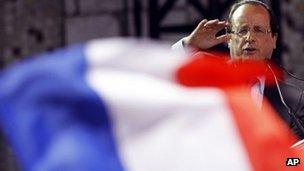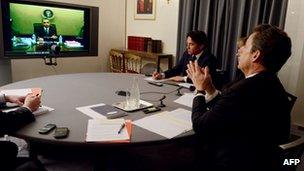France election: Hollande's place on world stage
- Published

Francois Hollande is favoured to win the election
Many see the French president as a kind of republican monarch - more powerful than equivalent heads of state in other democracies and with fewer constraints on his power.
Nowhere is this clearer than in the field of foreign policy which, throughout the Fifth Republic, has been seen as a reserved presidential domain.
No wonder then that Nicolas Sarkozy stamped his personality on France's relations abroad
He brought France closer to the United States
French forces were re-integrated into Nato's military command structures
He took a significantly more friendly tack towards Israel
He took a muscular approach to international crises - speaking out strongly for tough measures against Iran's nuclear programme and on Libya pressing for direct military intervention
So if Socialist candidate Francois Hollande - consistently ahead in the opinion polls - were to win on Sunday, how would French foreign policy change?
Experience gap
It is a question I put to veteran French analyst Dominique Moisi.
Mr Hollande's style would, he told me, be very different "not least because his international experience is very limited".
President Sarkozy was strong on high-profile diplomacy and eager to seize upon events to propel France into a driving seat.
In the summer of 2008 he took the helm of EU efforts to broker a peace deal between Russia and Georgia and French warplanes were first into action against Libyan government troops in March 2011.
In both cases France was by no means acting alone but Nicolas Sarkozy sought to leverage its interventions to bolster French foreign policy goals.
Mr Hollande is not Mr Sarkozy. Indeed it is the current French president's personality, as much as anything else, that was rejected by many voters at the first ballot.
So Dominique Moisi believes that the style of French foreign policy would change under Mr Hollande but he adds one important caveat: Mr Hollande could change while in office.
Merkel's choice
Mr Hollande's chief challenge would be how to deal with German Chancellor Angela Merkel and his other European partners, says Francois Heisbourg, a strategic adviser at the Paris-based think-tank FRS.
Much has been made of Francois Hollande's desire to promote growth and his unhappiness with the European Union's whole approach to austerity, championed by Mrs Merkel.
Indeed the German chancellor has made no secret of her preference for the re-election of Nicolas Sarkozy.
But Mr Sarkozy's policy of sticking to the Germans and doing what they want has reached its limits, Heisbourg argues.
"The whole thing has been undermined by the downgrading of France's credit rating and the current state of the European economy.
"Hollande could be in a relatively strong bargaining position. The writing is on the wall and if Chancellor Merkel chooses - for political reasons - not to read it then the markets will clobber Europe."
"Given his background and history, Francois Hollande is probably at heart more of a European than Sarkozy," Moisi argues.
After all, he worked closely in his formative years with Jacques Delors - one of the great architects of the European Union.
"Hollande," says Moisi, "has an understanding for Europe, an understanding of the centrality of Europe.
"That is why he is credible when he says he wants to change Europe."
One central aspect of French defence policy over recent years has been to try to intensify co-operation with Britain - the only other country in Europe that maintains similar military ambitions.
Moisi argues that the Anglo-French understanding - especially in the defence sphere - would continue under Mr Hollande.
But he also warns against the idea that somehow Mr Hollande would seek to destabilise the Franco-German relationship.
Fences to mend
What, though, of the more "atlanticist" accent that Nicolas Sarkozy has given to French foreign policy?

Mr Sarkozy's relations with Mr Obama were cool
"Here, there would not be a significant shift," says Moisi.
Both he and Heisbourg agree there would probably be a return to a more traditional pattern of French diplomacy.
On the other hand, the personal relationship between Barack Obama and Nicolas Sarkozy was highly competitive, Heisbourg says.
"Obama was the only US head of state who managed on a 48-hour official visit to Paris to spend two meals with his wife in restaurants without his French counterpart!" he recalls.
"There was an immediate mutual aloofness, to use a mild word."
On the Middle East, Heisbourg believes Hollande will maintain Nicolas Sarkozy's improved ties with Israel, albeit with a change of style.
In any case, he adds, the recent relationship between Israeli Prime Minister Benjamin Netanyahu and the French president was "very fraught".
On Afghanistan, Dominique Moisi points out, Mr Sarkozy wants a withdrawal of French combat troops by the end of 2013 while Mr Hollande has said he wants them out at the end of 2012.
But in broad terms an Hollande presidency would signal a large measure of continuity in both foreign and defence policy.
Indeed, foreign policy has not played a significant role in the presidential campaign.
"On balance," says Dominique Moisi, "Nicolas Sarkozy's record in foreign affairs is widely seen as globally positive.
"This context inevitably favours a broad continuity."